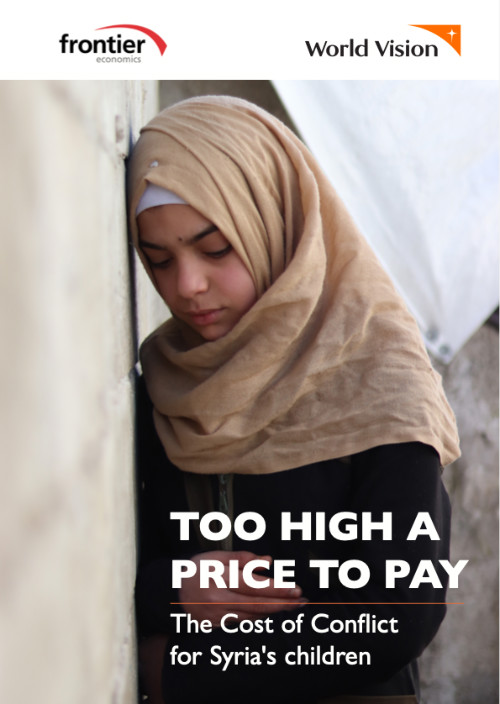Syria’s 10 year civil war has cost more than $US1.2 trillion, according to a new report. It also found that even if the conflict ended now, the war would cost as much as an additional $US1.7 trillion by 2035.
The World Vision and Frontier Economics report – Too high a price to pay: The cost of conflict for Syria’s children – says that close to 600,000 people, including 55,000 children, have been killed in the decade-long conflict while almost 12 million people have been displaced.

Cover of the World Vision and Frontier Economics report – ‘Too high a price to pay: The cost of conflict for Syria’s children’.
“An entire generation of children has been lost to the conflict in Syria,” the report says. “Today, Syria is one of the most dangerous places in the world to be a child…Children and their families live in constant fear of violence that threatens death or sexual assault, particularly against women and girls. COVID-19 has made this dire situation so much worse, with predictions the pandemic may push Syrians to the brink of mass starvation.”
According to calculations made for the report, the economic cost of the war – taking into account the impact of violence and forced displacement resulting in limited access to education and healthcare, as well as its psycho-social effects on children – equates to more than as $US1.2 trillion in lost GDP – a figure which is close to the European Union’s budget over the decade to 2019. The report’s authors also say that if even the war ended today, the economic cost will include an additional $US1.4 trillion by 2035 – a figure which rises to almost $US1.7 trillion “if we figure in that children whose education and healthcare have been negatively affected will contribute less to GDP once they are working adults”.
The report also reveals that humanitarian aid to Syria over the course of the 10 year war, meanwhile, equates $US19.4 billion – just 1.6 per cent of the economic cost.
It says that central to the report’s economic analysis is evidence that the the conflict has reduced the life expectancy of a Syrian child by 13 years while primary school enrolments have dropped by 21 per cent and secondary school enrolments by 28 per cent.
Elsewhere, the report found that of the more than 4,000 children who the UN has verified have been associated with armed forces or groups since at least 2013, some 82 per cent have been used in direct combat roles and 25 per cent of them have been under the age of 15 years. More than 1,700 children have been detained or deprived of their liberty during the conflict, often for years at a time and in at least 88 cases children experienced torture while detained.
The data also shows that at least 1,435 schools and hospitals have been attacked during the conflict, preventing children from accessing “the most basics rights of healthcare and education,” the report says. The document, which also draws on the findings of a World Vision survey of almost 400 children and young adults in Syria, Lebanon and Jordan, found that more than 75 per cent of those children spoken to were not attending school.
Meanwhile, there is evidence the incidence of child marriage has increased significantly since the conflict with more than 43 per cent of children spoken to by World Vision stating they knew a boy or girl who had married under the age of 18.
“Family loss and separation, attacks on safe spaces intended for play or care, the experience of conflict and repeated displacement, and the trauma of bearing witness all carry an immeasurable burden on the current and future generation of Syrians,” the report says.
The report contains a number of recommendations including that all parties to the conflict in Syria immediately cease “grave violations” against children’s rights, that the international community step up donor efforts and renew financial commitments and that the negative impact of sanctions on civilians in Syria be addressed.
Daniel Wordsworth, CEO of World Vision International, said in a statement that the world has “stood by and allowed this conflict to rage for 10 years, robbing children of basic rights and preventing an entire generation of girls and boys from reaching their potential”.
“I have met children, the victims of this conflict, whose lives have been shattered – loved ones killed, girls and boys out of school, begging on the streets and facing new threats of violence in the places they have fled to.”
Revealing the impact of the war on children, Johan Mooij, director of World Vision’s response to the Syrian crisis, said they were seeing children on a daily basis in Syria who were “hungry, cold and deeply distressed by what they have witnessed and experienced.”
“Boys and girls aged five or six can name every type of bomb by its sound, but sometimes can barely write their name, having missed out on the chance of an education,” Mooij said in a statement. “We cannot let them remain trapped in this cycle of violence. We must stop the war and the shadow pandemic of violence against children before it is too late.”
Wordsworth added that the world has a “moral responsibility” to do everything in its power bring about peace in Syria.
“The economic costs are devastating, and children continue to pay the price. We need political will, financial support, and a collective passion for peace and security. We must act now to bring hope.”





